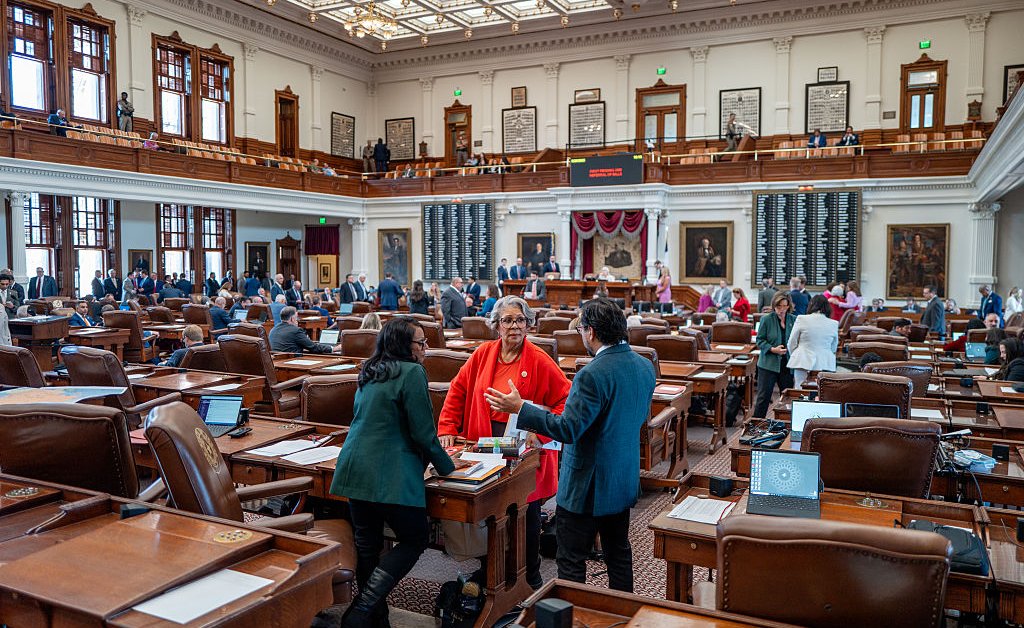Texas Republicans are likely to clear a key hurdle in their bid to pass sweeping redistricting plans in the state on Wednesday, despite a two-week-long protest from Democrats and a two-night camp-out from one representative in the Capitol building.
Democrat Texas Rep. Nicole Collier stayed locked in the chamber of the Texas Legislature for 48 hours rather than adhere to strict new surveillance rules implemented by lawmakers following a Democratic walkout in protest over a plan to add five more GOP seats in the U.S. House of Representatives.
It came after more than 50 state Democratic representatives left Texas for two weeks to deny Republicans a quorum and delay a vote to drastically redraw the state electoral map to the Republican Party’s advantage. Republicans issued civil arrest warrants to bring the Democrats back to the state to force their eventual return.
Read more: Why the Texas Redistricting Plan Caused Democrats to Flee and Could Help Trump in the Midterms
New guidelines introduced following that protest prevented party members from leaving the House chambers without a police escort and a signed permission slip. Collier refused to sign the “permission slip” to leave the chamber, saying that she did not want to “sign away [her] dignity.”
Republicans finally took up the redistricting session on Wednesday morning after achieving the necessary quorum for a vote, meaning Collier and her Democratic colleagues’ protests against the plan are likely to come to an end.
In a last-ditch effort to delay the redistricting plan, Minority Leader Gene Wu planned to introduce an amendment that would require the new House map to take effect only after the files related to the crimes of sex offender Jeffrey Epstein are released. Epstein’s files have haunted President Donald Trump and his Administration as both Democrats and many in his own base have called for them to be released this summer.
The vote could go well into the evening in Austin, depending on how long the Democrats continue to try to stall the plan.
Trump has long called for redistricting in Texas in hopes of protecting the Republicans’ thin majority in the U.S. House of Representatives, which currently stands at 219-212.
“I got the highest vote in the history of Texas, as you probably know, and we are entitled to five more seats,” Trump said in May. It was unclear what legal or Constitutional mechanism he was referring to that entitled him to 5 more seats.
With the Democrats having returned from their protest, the Republican representatives now have the numbers necessary to continue their vote, despite their protest to the round-the-clock police escorts to ensure their attendance at Wednesday’s session.
Read More: The Difference Between Gerrymandering and Redistricting, Explained
Collier was joined in her protest on Tuesday by several Democratic State Reps., including Mihaela Plesa, Morales Shaw, Rhetta Bowers, Cassandra Garcia Hernandez, Salman Bhojani and Minority Leader Wu, who remained overnight with Collier, locked into the chamber until the House reconvened in the morning.
Former Vice President Kamala Harris called Rep. Collier on the phone to cheer her on on Tuesday: “You are among those who history will reveal to have been heroes of this moment, so you just stay strong,” she said. “We are in that room with you.”
The GOP’s redistricting plan has set off a chain reaction of Democratic responses across the country.
California Gov. Gavin Newsom has launched his own plan to redraw his state’s maps and pick up more Democratic seats in the state with the most federal representatives. Other Democratic Governors have now joined Newsom, including Gov. Kathy Hochul of New York, who said that if Texas proceeds with its plan, “we must do the same,” as has Maryland’s Democratic leadership.








